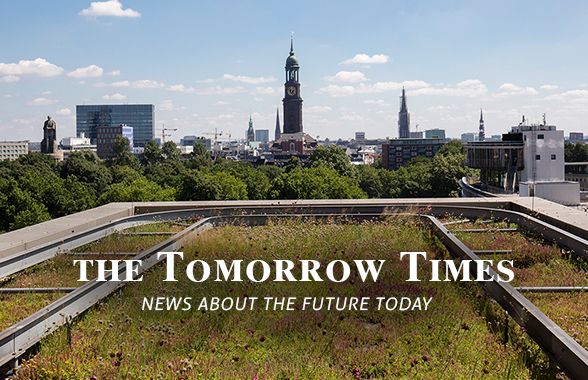Have you ever thought that electric cars are not sustainable in themselves? Have you heard that data will be the future of sustainable businesses, or that more and more entrepreneurs are experimenting with zero-waste food delivery services?
Discover how new business models can help fight climate change and improve the well-being of employees at once. Read about the new, disruptive IKEA stores planned in Vienna. In this edition of the Tomorrow Times, we share some of these latest happenings and much more, to keep you up to speed with the ever-in-development sustainability universe.
Stay curious, keep up to date, and get inspired, all in a quick read.
Follow these periodical monthly updates of tomorrow’s sustainability news today, by subscribing to the Tomorrow Times.
Energy & Environment

- Electric vehicles will bring energy and mobility sectors to converge. Electric vehicles’ uptake forecasts being published every year show that conventional vehicles may become an image of the past in as short as 30 years. But what about all the electric energy required to get this growing fleet of electric vehicles moving? The transport sector needs to get interestingly close to the energy sector going forward.
- Pacific 'blob' heatwave feared to have killed a million birds. Scientists appear to have solved the mystery of the death of 62,000 common murres who washed up on Pacific shores between 2015 and 2016. A new study published in PLOS One attributes the death to abnormally warm water that began forming in the region during the winter of 2013 and lasted a couple of years.
- Local communities share the benefits of the energy transition. In Denmark, every new wind farm must be partly owned by local people. All new wind farms in the country must be at least 20% community-owned. This and other innovative initiatives are necessary steps to achieve a fair and sustainable future.
Business & Economy

- ‘Nice’ jobs can help fight climate change. Climate action is often about sacrifice: eat less meat, don’t fly, and buy less stuff. But climate action can also be about gain. Transforming our societies to stop climate change offers us the chance to make our jobs better, more socially useful, varied and creative while empowering employees and productivity.
- Davos, January 2020. This year is the 50th Annual Meeting of the World Economic Forum in Davos. Businesses, governments and civil society have gathered to discuss the most pressing global issues with a view to improving the state of the world. A group of 140 of the world’s largest companies pledged to develop a core set of common metrics to track environmental and social responsibility.
- Food delivery start-ups using reuse principles are rising. Ordering restaurant delivery with zero packaging waste is often impossible, start-ups around the globe pop up to change that. Three young Brooklyn parents launched their new zero-waste restaurant delivery service in NYC with DeliverZero. Also GO Box in the US, Dabbadrop in the UK, Returnr in Australia and Ozarka in the Netherlands take the lead. Will reusable packaging become mainstream at the end of 2020?
Science, Technology & Design

- The limits of technical solutions for the energy transition. Systemic solutions which take into account people and behavioural change are essential in the energy transition. A new publication reviews the evidence for rebound effects and negative spillovers from behavioural change in relation to energy saving.
- Tools and guidelines to analyze and design circular innovation. The Circularity Deck is a new card deck-based tool developed to help firms analyze and understand their circular economy potential. The Ellen MacArthur Foundation helps to understand the (r)evolution of design through a toolkit for the circular designer. A learning path covers the four-stage circular design process and highlights six strategies to incorporate the principles of the circular economy into your designs.
- Scotland on the forefront of innovation to reach 100% renewables by 2020 climate summit. The host for the 26th Conference of Parties (COP26) makes most progress on wind power. On the technology front, it lays claim to installing the world’s first floating offshore wind farm, the 30MW Hywind project, to which it added last June a 1MW onshore battery storage system.
Urban Environment

- Indoor vertical farm fully automated in Cincinnati. Modern indoor vertical farming is popular in a.o. Japan and the Netherlands. Autonomous farming where robots plant, nurture and harvest leafy greens indoors. That's what's going to happen at a company called 80 Acres Farms, under construction just outside of Cincinnati, Ohio.
- The spine of San Francisco is now car-free. The plan to ban private cars from Market Street, one of the city’s busiest and most dangerous downtown thoroughfares, enjoys a remarkable level of local support.
- IKEA plans a new city store in Vienna, complete with green façades and no car parking. ‘The concept focuses on the current megatrends and takes into account the dramatically changed shopping behavior as well as a new form of mobility without a car,’ explains IKEA in a recent statement.
Unexpected and Intriguing

- Six trends that will shape sustainability transparency in 2020 and beyond. See how, among others, reliable data and sustainability reporting will play an important role in shaping the field and guarantee sustainability transparency.
- Uganda's refugee farmers are sowing seeds of change. Groups of refugees have formed cooperatives with local farmers who are unable to cultivate all their land and would rather see it farmed than lie fallow. The landowners lend the refugees plots of land that they farm, either solely or in groups. Some charge rent, but most take only a share of the harvest.
- 35 years of climate change in 125 seconds. A new time-lapse video from the American Geophysical Union (AGU) shows how 95% of the oldest, thickest sea ice has disappeared since 1984. Research finds the ice is more mobile and is vanishing twice as fast as ice in the rest of the Arctic.
Have you seen a news item suited for 'The Tomorrow Times'? Let us know and we'll consider including it in the next edition.
Previous Tomorrow Times editions
Find all Tomorrow Times editions and newsletters here.
March 3, 2020

